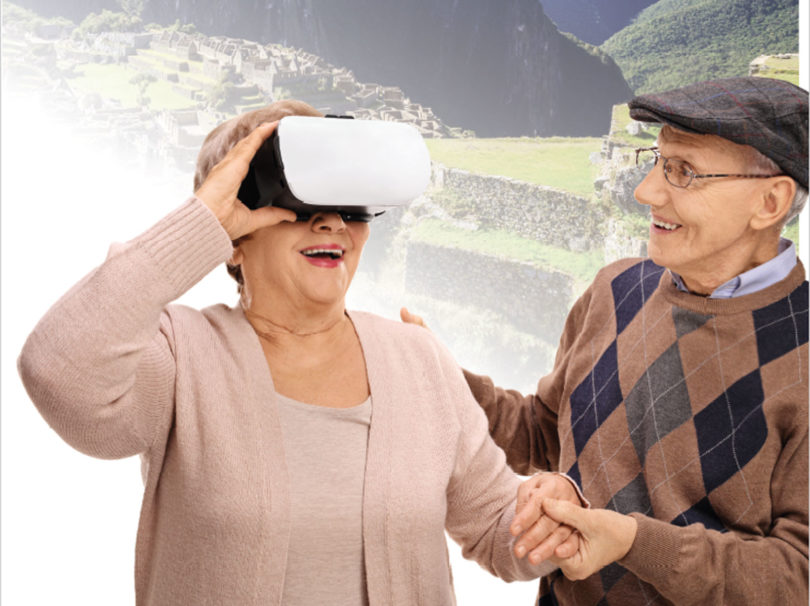It may look like the residents of Maplewood Senior Living are sitting around the facility’s library in Westport, Conn. But in their minds, they’re reaching for beads at a Mardi Gras parade, flying over the huge Jesus statue in Rio and visiting their long-lost childhood homes.
These cutting-edge seniors are using virtual-reality technology to experience places and events they otherwise could not.
“I keep thinking of the penguins,” says Maplewood resident Joe Messina, whose virtual-reality episode took him to snow, the woods and to Machu Picchu, an Incan mountaintop city in Peru. In one scene, penguins were surrounding him, coming right up to him and causing him to turn to his side to look for them.
“And they weren’t there!” Messina recalls, laughing at the memory of how real it seemed. In the future, he says he’d like to use virtual reality, or VR, to visit his grandparents’ home in Sicily.
Maplewood’s VR gear is made by Rendever, one of several companies across the United States promoting virtual-reality experiences for seniors. Companies are increasingly using VR components in the medical and education fields, including for heart simulators to help medical students in Japan and in therapeutic devices to treat substance-abuse disorder.
Rendever co-founder Dennis Lally was a healthcare investment banker who left the corporate finance world to pursue his entrepreneurial dreams. While in the MBA program at the Massachusetts Institute of Technology, he met his partner, Reed Hayes. They discussed bringing VR to seniors. After seeing the delight of an 88-year-old woman experiencing virtual reality for the first time, they were hooked.
If you’ve never tried virtual reality, you might wonder how it differs from watching a video. The key is in the immersive, responsive nature. Put on a VR headset and suddenly you see only what’s in the virtual world. Turn your head, and you see what’s to the right or left. It’s a 360-degree experience that lets people feel as if they’re flying, skiing, mountain biking, wandering, swimming underwater or whatever the programmer has created.
As the United Kingdom-based Virtual Reality Society explains it, “If you can present your senses with made-up information, your perception of reality would also change in response to it. You would be presented with a version of reality that isn’t really there, but from your perspective it would be perceived as real.”
Virtual reality appeals to a wide range of ages and interests. But it has special applications for seniors. In addition to the considerable entertainment value, Rendever was developed especially to work in memory care. It can track movement data to aid in early diagnosis of dementia and provide cognitive therapy to people with Alzheimer’s. Last year, Rendever won the coveted $25,000 grand prize in the MIT Sloan Healthcare Innovations competition.
“I enjoyed it immensely,” Messina says of his experience. “It was a surprise because I had never done it before.”
Fellow Maplewood resident John Sacco is also part of the Connecticut group experimenting with virtual reality. While he enjoyed the VR travel experience — “How about the fact that you didn’t have to climb all those stairs to be able to see Machu Picchu?” he pointed out — he says he’s more excited about other virtual experiences. As a retired physician, Sacco says he can see the potential for research projects. “I would think that immersing someone with a memory deficit into a milieu, right in the middle, over a period of time you might be able to penetrate whatever the problems are,” he says.
Also, there’s football. “I think now with the drones that they’re using on the football field, we could be right in the middle of the plays,” Sacco says. “That would be interesting. Might get a couple of bruises.”
The Maplewood group program is still in the beta-testing phase, but residents are looking forward to more. For some residents who never had much opportunity to travel, Sacco says, they finally have the chance to see the world. There’s also potential for residents to participate virtually in private and family events that they’re unable to attend in person, such as a grandson’s wedding in Greece — a VR treat that Lally is planning for his own grandmother.
CEO and co-founder Kyle Rand emphasizes how real the VR experience is to participants. “Watching a standard video or news clip that highlights Mardi Gras is nowhere near as special as putting on one of our headsets and looking around at the festivities while sitting on top of one of the parade floats,” he says. “This full immersion really shows in the residents’ reactions — residents sitting on that float will start smiling and waving to everyone on the street — and some will even try to give high fives to passers-by!”

